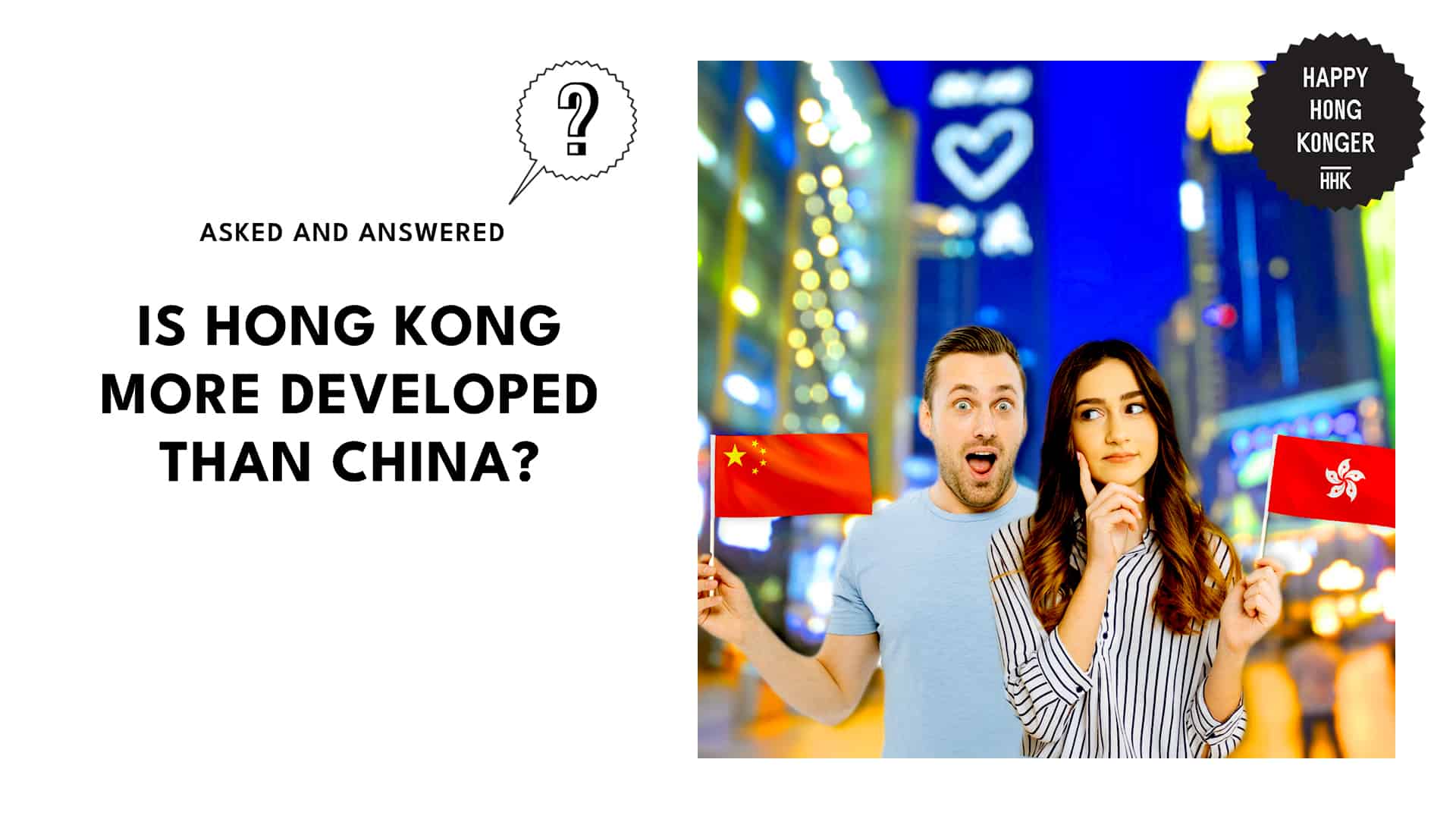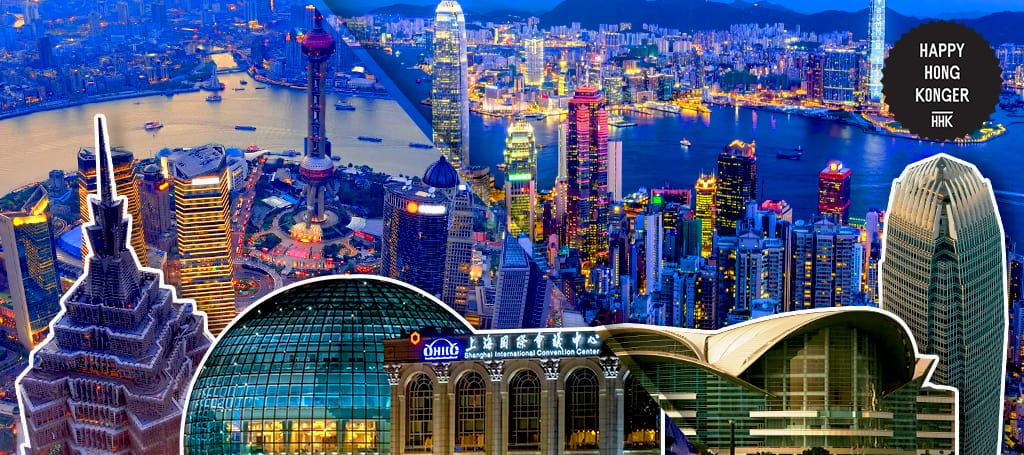Categories > Guides and Tips

Is Hong Kong more developed than China?
Did you know that in Hong Kong, there are more Rolls Royce’s per person than in any other city in the world? And while RR ownership isn’t a benchmark of a city’s overall wealth, it does speak a lot about the general financial power here!
Part of this power comes naturally from a city’s development. And with China (we mean the mainland whenever we say that in this article) being an Asian economic powerhouse, people often wonder – is Hong Kong actually more developed than China?
Is Hong Kong more developed than China?

Traditionally, Hong Kong has been seen as more developed than China. It has a strong economy, great infrastructure, and generally a higher standard of living compared to some parts of mainland China.
This is somewhat expected since Hong Kong operates as a Special Administrative Region (SAR) of China. Under the ‘one country, two systems’ framework, Hong Kong maintains separate legal and economic systems from mainland China while still being a part of it.
But when we start comparing Hong Kong and China’s overall development, things get a bit complicated. They have their own styles: different politics and different ways of doing business.
Sure, Hong Kong shines in many areas, but there are times when China is more developed. They both bring something different to the table with their strengths, challenges, and different stages of development.
Economic Freedom

Hong Kong is consistently ranked among the top 10 in global indices measuring economic freedom. For 24 years, from 1995 to 2019, the Heritage Foundation hailed Hong Kong as the world’s freest economy.
One of the reasons behind this top-tier status is Hong Kong’s approach: low taxes, minimal government intervention, and a wholehearted embrace of free trade. This has created a dynamic atmosphere where entrepreneurs thrive and international investments flock in.
China, on the other hand, has been working on its economic game plan. It’s introduced some market-oriented reforms, and recently, its service sector has shown promising growth.
But there’s still a noticeable level of government control lingering in crucial sectors, holding back some of its potential.
Verdict: Hong Kong unquestionably leads in economic freedom. Its long-standing title as the world’s freest economy highlights its exceptional development in this area.
While China progresses, Hong Kong sets the standard, fostering an environment that fuels innovation and attracts businesses, solidifying its edge in development.
Infrastructure

Hong Kong has modern transportation and generally reliable utilities. Plus, it’s a major hub for all things commerce and logistics.
For daily commuters, Hong Kong has the MTR, buses, and ferries that zip around the entire city. In general, these options are convenient and the fares are cheap for an average Hong Konger.
However, China does have some serious high-speed trains and efficient subways. A lot of these are reminiscent of Japan’s top-class train systems, which tourists will definitely love and appreciate.
On the contrary though, China’s public transportation isn’t as efficient as Hong Kong’s when it comes to reaching everywhere. Though to be fair, the Chinese tend to invest in their own cars compared to Hong Kongers) which makes traveling much easier.
Additionally, Hong Kong has stable, steady, and clean water. The electricity is also reliable, with rare blackouts happening across the city.
China is definitely a big shot when it comes to electricity production and use, plus, they have vast water resources. The catch though is that the water isn’t spread out evenly, and some parts are seriously parched.
Both Hong Kong and China aren’t slouches when it comes to infrastructure. But Hong Kong sneaks ahead a bit thanks to its smaller size, packed-in vibe, and longer history of development.
Verdict: In terms of infrastructure, Hong Kong slightly edges out China. Its compact setup, superior transport network, and reliable utilities give it a bit of an advantage.
Job Opportunities

Hong Kong and China both have vibrant job scenes, each with distinct vibes and strengths.
In Hong Kong, the job scene thrives in finance, trade, and professional services. Their strong regulations and access to global markets attract a diverse clientele.
With top-notch infrastructure, it’s a hub for companies seeking excellent professional services across industries.
Notably, Hong Kong’s job market in 2023 kicked off stronger than in previous years, witnessing a surge in vacancies (particularly in retail, hotel, and tourism), reaching 34,125 full-time openings in the second quarter.
Conversely, China excels in manufacturing, infrastructure development, e-commerce, and technology. Its remarkable two-decade economic growth reflects this prowess.
Yet, amid the shift from low-cost manufacturing to a tech-driven economy, youth unemployment is rising faster than in other age groups.
Nonetheless, China is actively striving to bolster job opportunities. Sectors like technology and healthcare are witnessing a demand for skilled workers.
Moreover, the government is taking initiatives to stimulate the economy and create jobs. Investments in infrastructure and initiatives promoting entrepreneurship are anticipated to unlock further job prospects.
Verdict: Both regions offer diverse job markets, but Hong Kong’s specialized industries and recent vacancy surge suggest a relatively robust job scene compared to China, albeit within certain sectors.
Technological Advancement

Both Hong Kong and China have made significant strides in technological innovation, contributing distinctively to the global tech landscape.
Hong Kong shines in financial technology (FinTech) and smart city applications.
Thanks to its robust financial sector and supportive regulatory framework, companies here are developing pioneering solutions in mobile payments, data analytics, and blockchain technology.
However, it’s evident that China’s technological dominance extends across a broader spectrum.
It’s powered by substantial investments in research and development, specifically focusing on artificial intelligence (AI) and 5G technology.
Leveraging its vast resources and a dedicated approach to innovation, China has achieved remarkable breakthroughs in these cutting-edge fields.
Verdict: China leads in overall tech advancement with hefty investments in AI and 5G, giving them a solid edge in cutting-edge innovation over Hong Kong.
Education

Hong Kong boasts nearly 20 higher education institutions granting degrees, with eight being publicly funded.
All eight public universities in Hong Kong predominantly use English as the primary language for instruction across a wide array of courses, earning significant recognition and respect well beyond the local sphere.
In the QS World University Rankings, the University of Hong Kong maintains its position as the highest-ranked institution in Hong Kong
It’s followed by the Chinese University of Hong Kong, Hong Kong University of Science and Technology (HKUST), City University of Hong Kong, and Hong Kong Polytechnic University.
Meanwhile, China has also made significant strides in the education sector. Mainland China proudly houses over 70 institutions listed in the QS World University Rankings.
Tsinghua University, known for its excellence in architecture programs, and Peking University, renowned as a prestigious research institution, lead the way.
Verdict: In education, it’s a close match. Hong Kong shines with its bilingual focus and top-notch universities, great for global careers. Meanwhile, China’s strong suit in architecture and engineering could lead to groundbreaking innovation. Both have their strengths—it’s a tie!
Hong Kong vs. China: Which is more developed?

Let’s break it down! Here’s a quick rundown showcasing where Hong Kong or China shines brighter in various areas!
| Category | Winner |
| Economic Freedom | Hong Kong clearly leads, boasting an exceptional environment for innovation and business and setting a benchmark for economic freedom. |
| Infrastructure | Hong Kong edges out a win due to its superior transport and reliable utilities, giving it a slight advantage. |
| Job Opportunities | In terms of job opportunities, Hong Kong takes the lead due to its specialized industries and recent surge in vacancies, indicating a notably robust job market. |
| Technological Advancement | China takes the lead with its substantial investments in AI and 5G, elevating its position in cutting-edge innovation. |
| Education | Another tie! Hong Kong’s bilingual emphasis and top-tier universities align with China’s focus on architecture and engineering courses, showcasing distinct strengths in education for global competitiveness. |





